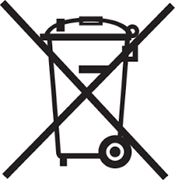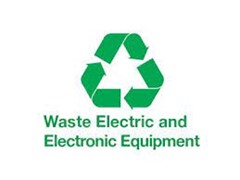Home | Uncategorized |
You might have heard the term WEEE recycling or WEEE disposal. Maybe you’ve seen the symbol of a crossed-out wheelie bin – But do you know what it stands for or what it does?
The WEEE label symbol indicates that the product should not be discarded as unsorted waste but must be sent to separate collection facilities for recovery and recycling. The WEEE marking must appear on any electrical and electronic equipment placed on the EU market.

What is WEEE waste?
WEEE stands for Waste Electrical and Electronic Equipment – in other words, electrical and electronic goods large or small, with a plug, cable, or battery that are being thrown away.
Why is WEEE recycling so important?
Recycling our old unwanted electricals is an important way of saving precious natural resources and curbing climate-changing emissions. It is something more and more of us can do as the recycling network expands and improves. According to https://www.hse.gov.uk/waste/waste-electrical.htm
Every year an estimated 2 million tonnes of WEEE items are discarded by householders and companies in the UK.
There are ten broad categories of WEEE currently outlined namely:
- Large household appliances – e.g. fridges, cookers, microwaves, washing machines and dishwashers.
- Small household appliances – e.g. vacuum cleaners, irons, toasters, clocks, hairdryers, and straighteners.
- IT and telecommunications equipment – e.g. personal computers, copying equipment, telephones, and pocket calculators.
- Consumer equipment – e.g. radios, televisions, hi-fi equipment, camcorders, and musical instruments
- Lighting equipment – e.g. straight and compact fluorescent tubes and high intensity discharge lamps
- Electrical and electronic tools – e.g. drills, saws and sewing machines, electric lawnmowers.
- Toys, leisure, and sports equipment – e.g. electric trains, games consoles and running machines.
- Medical devices – e.g. (non-infected) dialysis machines, analysers, medical freezers, and cardiology equipment.
- Monitoring and control equipment – e.g. smoke detectors, thermostats, and heating regulators.
- Automatic dispensers – e.g. hot drinks dispensers and money dispensers
What benefits have we seen from WEEE recycling?
The thing most of us will notice is that it’s becoming much easier to recycle our old electricals. There are more collection points than before, more retailers offering collection services, making it easier and more convenient to have our unwanted electricals reused or recycled.
The result? A lot more electrical waste is now being collected and treated than previously. Which is good news for the planet and the economy: fewer precious resources being sent to landfill means less carbon emissions, less mining for primary materials – and less damage to the environment and communities.
How do you dispose of WEEE products?
Electrical items and any products that use batteries should never be put in a household waste bin.
Disposal of electrical items should be done by returning them to the retailer or taking them to a recyclingcentre when getting rid of household electrical waste.
If you are hiring a skip or waste collection service with us at AB Waste Disposal and have some electrical appliances to dispose of, please call our service administrators on 01623 627447 who will be able to ensure that your WEEE waste is disposed in the most compliant and eco efficient way..
The UK translated the WEEE directive into national law. From 2007 this law obliged producers, retailers, and local authorities to collect, treat and account for electrical waste. https://www.recycleyourelectricals.org.uk/faq/what-is-weee-recycling-why-important/

